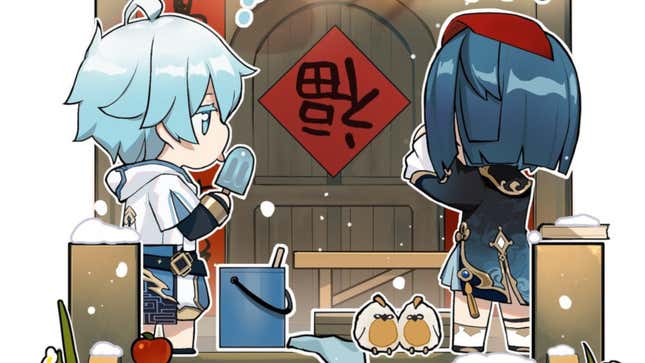
Queer Genshin Impact players have been eating well this month. During the gacha game’s anniversary web event, playable character Chongyun blushed as he stood with another playable character, Xingqiu. Later during the Moonchase Festival main quest, Xingqiu offered to read a romance novel to him (despite being a novelist of martial arts stories).
These moments haven’t come out of nowhere. The Genshin developer miHoYo has a history of embedding queerness into both events and seasonal content.
Since free-to-play Genshin Impact launched a year ago, it’s seen massive global success. Its characters bring in millions of dollars upon release, which makes their characterization even more important. That includes making it clear when playable characters are queer.
The earliest example I remember is bringing women’s perfume for Liyue’s god Zhongli’s funeral.
The fairy companion Paimon eventually asks, “Does that mean that [the god] is actually an older lady?”
When confronted by this hypothesis, Zhongli only replied, “[The god] has taken on countless forms. Perhaps that really was one of them.”
Later, I collected a novel called Rex Incognito, which further explored the legend of the god’s female form. These aren’t just one-off jokes. While never shown visually, the god’s non-commitment to a single gender was integrated as a core part of his legend.
During the spring event “Invitation to Windblume,” I had to help free Bennett and Razor from a cell they were trapped in. This would have been utterly unremarkable in itself, except Bennett had written a love poem to Razor while they were trapped together. There’s no heterosexual explanation for the line “You and the Mare Jivari, so close and yet so far. One at the edge of the world, the other in the center of my heart. Wolfhook and dandelion, my windblume offering to you.”
While it’s possible to call these queer moments an appeal to fanservice, not even NPCs are safe from Genshin Impact’s inclusion of gay characters. Ningguang has female secretaries who openly crush on their boss. A generic side character named Ellin pays very flattering compliments to the playable knight Jean and asks for advice on delivering a bouquet of flowers to her. While exploring the Inazuma region, I had to fight an emotionally repressed samurai before he would allow his old friend to confess his true feelings to him. While this example was less blatant, all of the emotional beats felt like they were taken from a romantic drama.
Once I reached Watatsumi Island, however, all subtlety was thrown out the window. The NPCs Kumi and Anisa flirt with each other at the end of their quest, and the player character admonishes their fairy companion for not realizing that a situation had become romantic. These intense moments between plain-looking NPCs don’t contribute to fanservice, but they’re integral to building a world where same-gender relationships are a normal part of everyday life—something that Fire Emblem: Three Houses failed to do, despite having gay romance options.
I get it, gay readers. Some people are going to be disappointed that nobody gets married outright and that every relationship could be misconstrued as friendship. But frankly, I’m okay with that in a game that’s also ambiguous about the romance between straight characters (I’m still convinced that Zhongli was only very good friends with the dust goddess). And if we’re constantly trying to prove that gay content isn’t real unless a kiss was involved, then we deny ourselves the joy of seeing a larger spectrum of queer experiences.

